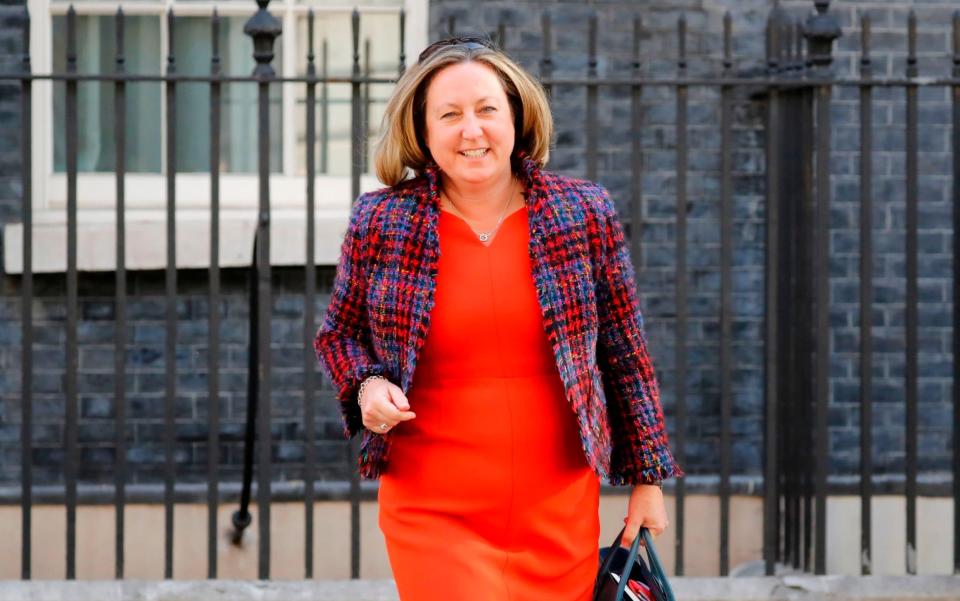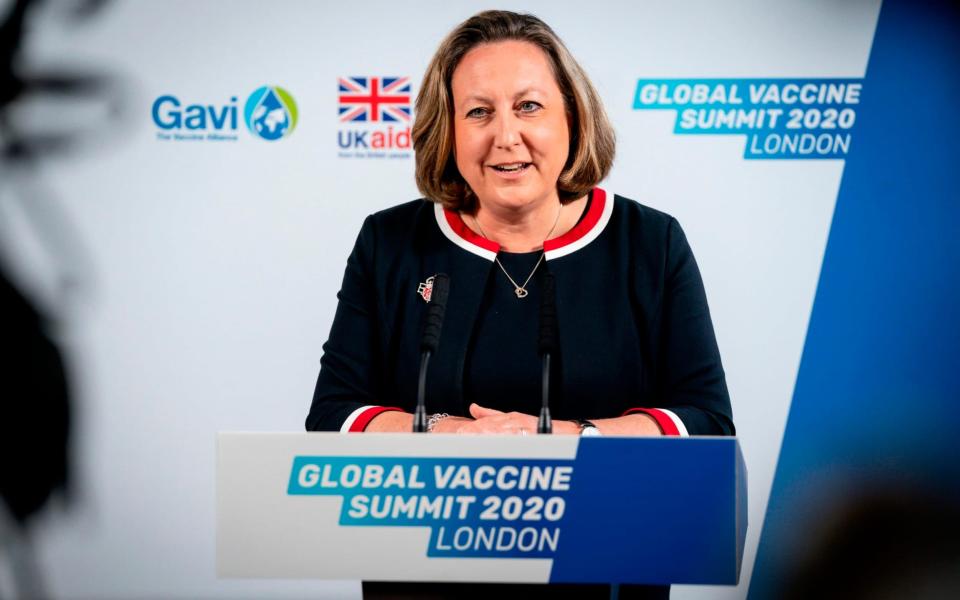Switch away from oil and gas is top of my to-do-list, says Anne-Marie Trevelyan

Anne-Marie Trevelyan’s constituency of Berwick-upon-Tweed, Northumberland, has tasted its fair share of battles over energy policy.
Plans by Durham-based miners, The Banks Group, to produce coal near the picturesque Druridge Bay on the North Sea coast were approved by Northumberland County Council before being kicked out twice by Conservative ministers.
Ms Trevelyan, 51, sided with local opponents to the mine, celebrating their victory in September 2020 after a “long fought battle to protect our communities”.
Years earlier, in 2011, she spoke out against onshore wind developers wanting to “trash our landscape”.
The experiences have perhaps given her a particular perspective as she takes on her new job as energy minister at a time of an unprecedented push towards renewable energy.
Her boss, Boris Johnson, once dismissed wind power as too weak to “pull the skin off a rice pudding,” but has now put it at the heart of his strategy to cut carbon emissions to net zero by 2050.
Tensions are inevitable as businesses and individuals are asked to change their ways as the energy system is overhauled, creating opportunity but also huge upheaval.
It emerged last week that the government is exploring new carbon taxes meaning that all sectors, not just the most polluting, will be charged for their emissions, with costs likely to be passed onto consumers.
One of Ms Trevelyan’s first tasks is to negotiate with North Sea oil and gas drillers on a “transition deal” to help them cut their emissions and embrace newer technologies such as low carbon hydrogen and carbon capture.
Her predecessor, Kwasi Kwarteng, indicated that North Sea drillers will not get licences unless they commit to slashing their emissions, amid a government licensing review.
“It’s on my list of things the PM wants me to get out of the door – one of the early ones, it is a long list,” she says, in her first interview since taking on the role. “I have had some really good discussions with a number of key businesses. As we build our alternative energy supply, we need to keep our houses going and our lights on and the North Sea supply line is a critical part of that. We can’t do without them on the way through.”
Today, the government is also unlocking more funding to help heavy polluters to decarbonise, opening a second round of its £289m Industrial Energy Transformation Fund.
‘No one is safe unless everyone’s safe’
Ms Trevelyan has risen quickly up the Conservative ranks since becoming an MP. Born in London, she trained as a chartered accountant and started her career in PwC’s corporate finance department.
After moving to Northumberland, she lost two council elections and one parliamentary election before getting elected in 2015 for Berwick-upon-Tweed, a rural Conservative stronghold. She served as minister for the Armed Forces and minister for defence procurement in 2019, and then joined Mr Johnson’s Cabinet in February 2020 as Secretary of State for International Development.
That role was short-lived, ending in September when the department was folded back into the Foreign Office. Her move to the energy role is part of a reshuffle in which Mr Kwarteng has been promoted to business secretary so that Alok Sharma can take the lead on the COP 26 UN Climate Change Conference the UK is hosting in Glasgow in November.
Ms Trevelyan also has a key role at the conference, supporting developing countries to try to lessen the impact of climate change. “It’s the same argument as Covid,” she says, “No one is safe unless everyone’s safe. Unless we all look after each other, we wont get to where we want to be.”
Energy security
Fresh in the energy post, she demonstrates an early willingness to push back on advice to the government from its climate advisers, staunchly defending Cumbria County Council’s plan to approve a new mine to produce coking coal to make steel.
The climate change committee has warned that the project will increase emissions while 85pc of the coal will be exported. Ms Trevelyan argues that its production of coking coal for the UK steel industries, which currently cannot run on anything else, gives it special status.
“We can either get it here from that mine, which has the support of the local community and the local council, or we can import it,” she says. “We want to have a steel industry in order to be able to build our turbines, power stations, nuclear ships, our cars. So we can either offshore the carbon cost on this coking coal that we need and not take responsibility for it, or we can say, as part of our energy security, we consider it to be part of the cost.”
She adds: “This is coal for the steel industry which we need and for national security reasons we want to be able to maintain that supply.” A similar argument of national self sufficiency has been made by supporters of onshore fracking. Ms Trevelyan says any review of the government’s moratorium on the practice, introduced in 2019 due to safety concerns, is a “non-starter”.
Nuclear commitment
Cumbria, where the coal mine is being dug, has also been eyed by nuclear power station developers, although plans for a potential new plant in Moorside were abandoned by Toshiba and have yet to be restarted by anyone else.
It leaves any hopes of replacing the UK’s ageing nuclear fleet on shaky ground, with France’s EDF and its Chinese partner, CGN, the only developers currently building. Their Hinkley Point C plant in Somerset is well advanced while the government is in talks with EDF about a second plant, Sizewell C, in Suffolk, as part of plans to invest in at least one nuclear power station by the end of this parliament.
Ms Trevelyan says nuclear is an “important part of our future”, voicing support both for emerging advanced and small modular reactors alongside established technology. “An important part of what we do is to kick-start all those components in the wider nuclear space along with making sure we deliver Hinkley and Sizewell and one other in the short term – relatively speaking – to make sure that nuclear baseload is embedded in our power supply,” she says.

Former Conservative leader Sir Iain Duncan Smith is among critics who say that the UK should review China’s involvement in the UK’s nuclear sector, arguing the Government “cannot turn a blind eye” to the country’s human rights abuses. The minister does not seem so minded. “We have a really good working relationship with CGN; they are very much a critical partner in this business,” she says. No inherent objection to their involvement? “We have a great working relationship with them on Hinkley.”
Building back better
The Government is plugging its green agenda as a way to help rebuild the country after the coronavirus pandemic, but there are concerns that the jobs needed to quadruple offshore wind capacity could go abroad.
“We have been very clear that we want to see a greater UK content in terms of production,” insists Ms Trevelyan.
“We want to make sure we do have the security of supply at every level. We will be working with industry to make sure that we get their commitment to it, so that when they are bidding in that’s part of their commitment,” she says.
One of the challenges for any energy minister at a time of such flux in the industry is cutting through the umpteen industry companies trying to bend the government’s thinking towards their view of the energy system.
BP, for example, sits on both the Government’s Hydrogen Advisory Council and the Prime Minister’s Build Back Better Council, while tidal, wind and nuclear interests all battle for ministers’ time. Does Ms Trevelyan feel she can get a balanced view?
“I would say a month in, no one has been shy about getting in touch and saying what they think from any part of the sector,” she says.
“If in government policy we are creating an unintended consequence I want to know about it, and to know about it as soon as possible.”
Read more: Shell’s slow-burn evolution risks leaving investors cold
